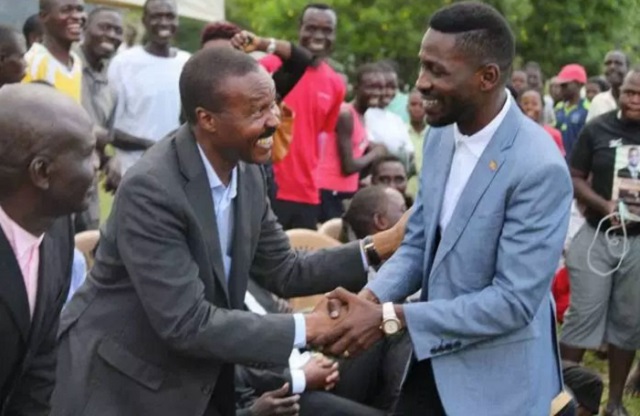
Strong will, less self-interest needed
Uncertainty around the level of nationwide support for Muntu and Bobi Wine leaves only perennial presidential contender, Kizza Besigye, as the bull in the opposition kraal. It also makes any alliance among opposition politicians and formations to be that between Besigye and minnows. But, at the moment it appears unlikely that Besigye will cause major defections from other political camps to his. According to analysts, the failure of Mugisha Muntu, Bobi Wine, or Besigye is a signal that the opposition will not field a joint candidate against Museveni in 2021.
“DP wants to field someone and so does People Power, so there is no coherent discussion,” says Richard Sewakiryanga, executive director of Uganda National NGO Forum, an independent platform for all NGOs.
“It has always been tough…uniting behind a single candidate. There are many ingredients that should be involved.”
He says there should be a build-up of consensus, a minimum agenda and what is collectively important for the opposition but that has not happened.
“Most actors are now pushing back against government excesses. By the time you get into choosing a candidature, you will not have invested enough time in the process.You cannot unite under a single candidate unless there has been consensus. There has been no considered discussion under whom to unite; Mugisha Muntu has just launched his own party and he is building his bases, FDC there is a mixed picture,” Sewakiryanga says.
Former minister and Democratic Party MP and national leader, Zachary Olum, says having a joint candidate would be “desirable” but it “requires a lot of strong will and less self-interest.”
That could explain why a joint candidate has not emerged. That could change as the race to the 2021 general election intensifies starting next month, when the Electoral Commission displays the National Voters Register and the registers of Special Interest Groups.
Two months later in April, the EC is scheduled to announce the nomination of candidates dates and immediately trigger a rapid series of nominations from village level right to MPs and the presidency in August.
Bobi Wine and his People Power group, perennial opposition candidate Besigye, and untried aspirant Mugisha Muntu of the Alliance for National Transformation (ANT) are being watched closely.
Some would-be likely obvious candidates, such as FDC President Patrick Oboi Amuriat; who is the leader of the biggest opposition party in parliament, appear to prefer remaining outside the ring, while perennial escorts Norbert Mao, Michael Mabikke, and Samuel Lubega from the Democratic Party (DP) main stream and its splinters could spring a surprise entrant.
There could also be the usual maverick entrants. The joker in the 2016 presidential race, Joseph Elton Mabirizi has made some noises. The other jokers of 2016, Abed Bwanika, Faith Kyala, and Benon Biraro are quiet but another could pop up in their place.
This pack of candidates is normally seen as spoilers because most of the opposition strategists and supporters appear to believe that a single, joint opposition candidate is the best option.
“Fragmenting your forces dissipates energy according to the law of physics,” said Zachary Olum who has in the past been involved in discussion on the DP side.
He told The Independent that “a joint opposition candidate is a good idea.”
“The opposition would be a much stronger force to reckon with looking at the way things are,” he said. Zachary Olum is describing what coalition theorists call the ‘signaling effect theory’; where candidates demonstrate to voters a willingness to govern together.
Having a single, joint opposition candidate is mathematically unchallengeable. The candidate would have a 50% probability of winning.
“We (opposition) must have a unified candidate and we are already in talks on how to go about it,” Besigye said is a New Year message.
Election results of previous years also appear to support the option of single opposition candidate. In all presidential elections, Museveni has got the most votes followed by the strongest opposition candidate. The rest have secured less than 1% of the vote. In 2016 Museveni won with 60% of the vote and Besigye was second best with 36% of the vote. The other six candidates on the ballot collectively secured less than 4% of the votes.
It happened even in the first national assembly election in 1962 which was contested by the Uganda Peoples Congress, the Democratic Party, the Uganda National Congress, the Uganda National Union, the Bataka Party and Independents. The UPC won with 51.9% followed by DP with 46%. The rest collectively got about 2% of the vote.
In 1980, UPC again won with 74 seats and DP got 54. The Conservative Party got zero and Museveni’s UPM got one seat.
But even in 1996, when longtime foes, UPC and DP ganged up against Museveni in the Inter-Party Forces for Cooperation (IPFC), a loose alliance, Museveni whipped them easily; winning with 74%of the vote against 24% of joint candidate Paul Kawanga Ssemogerere.
The previous results appear to predict that if Bobi Wine, Kiza Besigye, Mugisha Muntu separately ran against Museveni in 2021 as they are seen as the biggest contenders, they would lose. In fact, only one of them will garner a respectable percentage of votes and the other will collectively get less than 4% of the vote. However, as the 1996 Ssemogerere results show they could support a join candidate and still lose.
 The Independent Uganda: You get the Truth we Pay the Price
The Independent Uganda: You get the Truth we Pay the Price






Robert Kyagulanyi isn’t a political fuss he’s a strong force to reckon with and majority of Ugandas youths are behind him while others are coming in droves to bolster his people power movement PPM, in fair contest Robert Kyagulanyi will beat y k museveni hands down
The rest are political comedians dead woods who nolonger command respect in Ugandan society